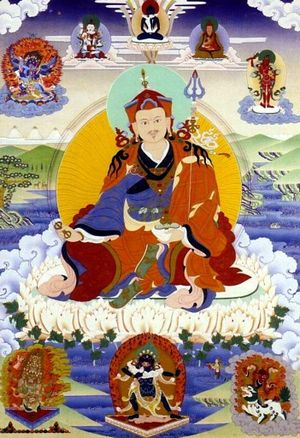Eleven deeds: Difference between revisions
Jump to navigation
Jump to search
Stefan Mang (talk | contribs) No edit summary |
Stefan Mang (talk | contribs) No edit summary |
||
| Line 4: | Line 4: | ||
#Forming the enlightened intend of taming beings ('''gro 'dul dgongs pa mdzad'') | #Forming the enlightened intend of taming beings ('''gro 'dul dgongs pa mdzad'') | ||
#Entering the 'womb' of the lotus (''pad+ma’i lhums zhugs mdzad'') | #Entering the 'womb' of the lotus (''pad+ma’i lhums zhugs mdzad'') | ||
# | #Spontaneously taking birth (''rang byung bltams mdzad'') | ||
#Enjoying | #Enjoying the pleasures of a prince (''rgyal sras rol rtsed mdzad'') | ||
# | #Taking ordination (''rab tu byung mdzad'') | ||
# | #Practicing various austerities (''dka’ thub sna tshogs mdzad'') | ||
# | #Overcoming Maras hosts (''bdud dpung 'joms mdzad'') | ||
#Attaining enlightenment as a Buddha (''sang rgyas byang chub mdzad'') | #Attaining enlightenment as a Buddha (''sang rgyas byang chub mdzad'') | ||
#Turning the Wheel of Dharma (''chos ‘khor bskor mdzad'') | #Turning the Wheel of Dharma (''chos ‘khor bskor mdzad'') | ||
#Practising yogic discipline (''brtul zhugs spyod pa mdzad'') | #Practising yogic discipline (''brtul zhugs spyod pa mdzad'') | ||
# | #Hiding terma treasures so that the Dharma will spread far and wide and never wane (''bstan pa mthar rgyas mi nub gter sbed mdzad'') | ||
[[Orgyen Tobgyal Rinpoche]] explains that Guru Rinpoche's life is characterized by eleven deeds rather than the [[twelve deeds]] traditionally ascribed to the Buddha because he has not passed into [[parinirvana]].<ref>Lerab Ling, 30 July 2011</ref> | [[Orgyen Tobgyal Rinpoche]] explains that Guru Rinpoche's life is characterized by eleven deeds rather than the [[twelve deeds]] traditionally ascribed to the Buddha because he has not passed into [[parinirvana]].<ref>Lerab Ling, 30 July 2011</ref> | ||
Revision as of 05:45, 24 February 2017

The Eleven Deeds (Wyl. mdzad pa bcu gcig) of Guru Padmasambhava, mentioned in the Chronicle of the Ministers (blon po'i bka' thang)[1], one of the Five Chronicles, are as follows:
- Forming the enlightened intend of taming beings ('gro 'dul dgongs pa mdzad)
- Entering the 'womb' of the lotus (pad+ma’i lhums zhugs mdzad)
- Spontaneously taking birth (rang byung bltams mdzad)
- Enjoying the pleasures of a prince (rgyal sras rol rtsed mdzad)
- Taking ordination (rab tu byung mdzad)
- Practicing various austerities (dka’ thub sna tshogs mdzad)
- Overcoming Maras hosts (bdud dpung 'joms mdzad)
- Attaining enlightenment as a Buddha (sang rgyas byang chub mdzad)
- Turning the Wheel of Dharma (chos ‘khor bskor mdzad)
- Practising yogic discipline (brtul zhugs spyod pa mdzad)
- Hiding terma treasures so that the Dharma will spread far and wide and never wane (bstan pa mthar rgyas mi nub gter sbed mdzad)
Orgyen Tobgyal Rinpoche explains that Guru Rinpoche's life is characterized by eleven deeds rather than the twelve deeds traditionally ascribed to the Buddha because he has not passed into parinirvana.[2]
Notes
- ↑ o rgyan gling pa. "blon po bka'i thang yig." In ‘’bka' thang sde lnga/ mi rigs dpe skrun khang/.’’ TBRC W17319.: 521. pe cin: mi rigs dpe skrun khang, 1986, 1997 printing. http://tbrc.org/link?RID=O1GS139908%7CO1GS1399081GS139918$W17319
- ↑ Lerab Ling, 30 July 2011